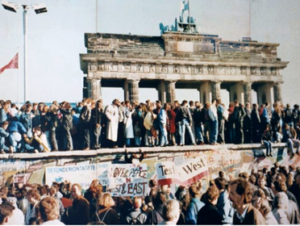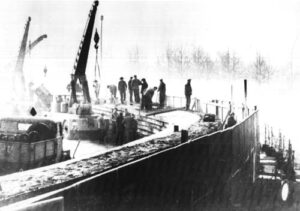 Imagine this: You’re waiting for the next train to Berlin Alexanderplatz at the train station Friedrichstraße. But before the train even stops, you let out an annoyed sigh. Not again, you think. It’s one of those old train cars, the ones with a step. Now you ask a strong-looking person for help, and even though it’s Berlin (which is not known for being the friendliest place in Germany), the person is willing to lift the front part of your wheelchair to help you get onto the train. Two stations later, you have to ask someone else for help to get off the train.
Imagine this: You’re waiting for the next train to Berlin Alexanderplatz at the train station Friedrichstraße. But before the train even stops, you let out an annoyed sigh. Not again, you think. It’s one of those old train cars, the ones with a step. Now you ask a strong-looking person for help, and even though it’s Berlin (which is not known for being the friendliest place in Germany), the person is willing to lift the front part of your wheelchair to help you get onto the train. Two stations later, you have to ask someone else for help to get off the train.
Tag Archives: Berlin
German Distance, American Naivety
As an American writer living in Berlin, I strain to understand and express some of the differences between my two homes. So many exceptions to any rule, no broad-brushstroke of a short essay is going to begin to capture anything but the most basic generalization. Still, let me try. Here’s a story plucked from memory.
Childhood Memories
Memories are stories we tell ourselves.

“When I was younger, I remember how…” We cherry-pick. We have to. Otherwise, we’d remember what we wore and ate for lunch a day before our 6th birthday, and the week before that. TMI.
Iron Curtain, Please
One man’s trash is another’s treasure.
Vladimir the Small, as history is sure to remember him, has pulled the iron curtain off the trash pile and ordered it rehung. His security blanket. Thirty years exposed to Western ideas of choice – enough of that. Obedience or destruction, enough choice for his people.
The good old days.

An Ode to Berlin – and to my Grandma

“It’s August 13, 1961 – the day East Berlin starts building the wall,” my grandma remembers.
“On Sunday night, August 13, Walter Ulbricht, East German head of state, issues an order to close the Berlin border. Police forces put up barbed wire fences. Within one day, West Berlin became an island in the sea of communism. Trains do not run anymore, and West and East Berliners stand shocked on opposite sides of the border.
I hear about it at Moabit hospital, where I just gave birth to my first child on August 9. I remember being afraid of a new war and feeling helpless in the hospital, alone with my child, barely 20 years old. Also, we’re separated from our family. My grandparents lived in the Russian sector after the war, just ten minutes from where we lived in the American sector. My husband had fled to West Berlin from Rostock in the East to marry me. His parents, grandparents, sister, and other relatives still live there. I feel so helpless and yearn for my family. The future seems so unsure.”
All the Stories That We (Were) Told

Life writing – which includes a wide spectrum of sub-genres such as (auto)biography, memoir, letter, diary, (digital) life stories, and oral histories – has a long tradition in the U.S. and is becoming more and more popular all over the world. An abundance of artifacts compiled by famous, semi-famous, and not-at-all-famous people fill public libraries, private bookshelves, research centers, social media, hard drives, and websites. And that’s actually not even surprising since writing and/or talking about ourselves is a deeply rooted cultural practice and comes very naturally to most human beings. We do it all the time: We tell a significant someone how our day was, we put together our résumé when applying for a new job, we talk about childhood memories with siblings or a close friend. However, talking and writing about ourselves in an academic context and, to boot, in a foreign language is a completely different story.







